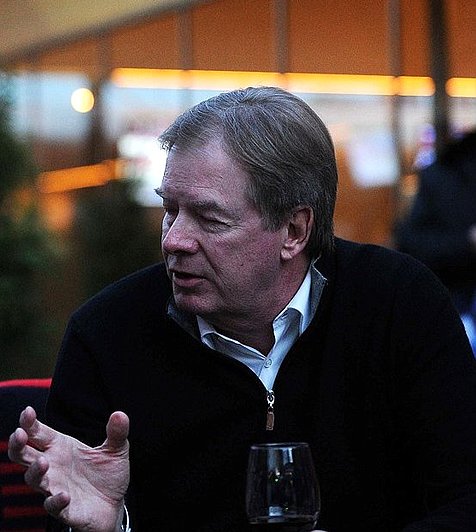News
Probst leaves complex legacy after 10 years as USOC chairman

“It’s now time for a new generation of leaders to confront the challenges facing the organization, and I have the utmost confidence in Susanne’s and Sarah’s ability to do just that.” (File Photo By Kremlin.ru/Wikimedia, CC BY 4.0)
DENVER — Larry Probst will step down as chairman of the U.S. Olympic Committee, exiting with a complicated legacy that includes restoring the federation’s international reputation while leaving it saddled with as many problems on the home front as he faced when he arrived.
Probst, who announced his departure Monday, will step down at the end of the year, to be replaced by Susanne Lyons, a board member who recently finished serving as interim CEO following the resignation of Scott Blackmun in February.
Lyons and new CEO Sarah Hirshland are tasked with restoring credibility to a federation that has been widely criticized for its slow response to a mushrooming sex-abuse scandal in Olympic sports.
“I became chairman at a difficult time for the USOC and worked diligently with my colleagues here in the U.S., and around the world, to change the USOC for the better,” Probst said. “It’s now time for a new generation of leaders to confront the challenges facing the organization, and I have the utmost confidence in Susanne’s and Sarah’s ability to do just that.
“
The 68-year-old Probst, a longtime executive at video-game behemoth Electronic Arts, spent hundreds of days overseas during his 10 years at the helm, helping repair badly fractured international relationships that stemmed from decades’ worth of financial disagreements with the IOC, to say nothing of the sometimes-curt style of his better-known predecessor, Peter Ueberroth.
Probst’s work helped bring the 2028 Olympics to Los Angeles, giving America a win after a number of embarrassments, including Chicago’s bid for the 2016 Games, and the mistaken, and ultimately aborted, choice of Boston as a candidate for 2024; both debacles came on Probst’s watch.
Probst also earned a highly coveted spot on the International Olympic Committee — a position that gave him insider status in the decision-making process. But critics said he didn’t use the position to advocate for U.S. athletes, especially on matters concerning Russian doping, where he rarely broke ranks with IOC president Thomas Bach, who supported Russia’s return to the Olympic fold despite solid evidence of wrongdoing.
In the United States, doping has been overshadowed of late by the sex-abuse scandal.
The USOC has gotten some credit for creating the U.S. Center for SafeSport to serve as a clearinghouse for all Olympic-related sex-abuse cases. But it has been criticized — and sued — for not acting quickly enough, or taking its share of responsibility. That played a part in Blackmun’s departure, and it’s no surprise to see Probst, whose greatest successes came with Blackmun at his side, follow him out shortly after.
Blackmun helped stabilize the federation after Probst and his board surprisingly dismissed CEO Jim Scherr following a successful 2008 Olympics and replaced him with Stephanie Streeter, whose short tenure was a complete failure. Many viewed Scherr’s firing as a self-inflicted mistake, and Probst was forced to spend a large part of his tenure rebuilding trust on both the domestic and international levels.
Among his successes were establishing a charitable foundation that raises multiple millions for Olympic athletes, the settling of a controversial revenue-sharing agreement with the IOC, and improving an already healthy financial situation under the tenure of Chief Marketing Officer Lisa Baird. (Baird left the Olympic movement last month.)
The U.S. also stayed atop the medals table in the Summer Games, and had largely successful Winter Olympics under Probst’s watch, though the U.S. team’s total of 23 in Pyeongchang earlier this year — its lowest haul in 20 years — raised some eyebrows.
That disappointing showing came as the Larry Nassar scandal was turning into front-page news, and one of the most-repeated critiques of the USOC was that its leaders cared about medals more than the people who won them.
The delicate task for Lyons and Hirshland will be to make sure the USOC keeps winning, while also changing the culture in their own organization, as well as in the various sports that make up the Olympics.
“I wish Susanne and Sarah the best of luck in handling the very complex and difficult scenario they find themselves in,” Scherr said.





















